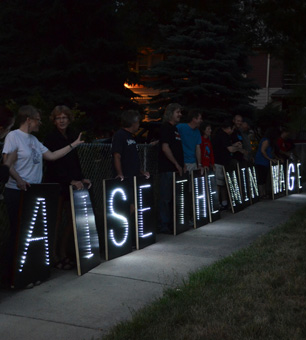It was encouraging to see President Obama propose an increase in the minimum wage in his State of the Union Address, even if the $9.00 target did not seem especially ambitious. If the $9.00 minimum wage were in effect this year, the inflation-adjusted value of the minimum wage would still be more than 2.0 percent lower than it had been in the late 1960s. And this proposed target would not even be reached until 2015, when inflation is predicted to lower the value by another 6 percent.
While giving a raise worth more than $3,000 a year to the country’s lowest paid workers is definitely a good thing, it is hard to get too excited about a situation in which these workers will still be earning less than their counterparts did almost 50 years ago. By targeting wage levels that roughly move in step with inflation we have implemented a policy that workers at the bottom will receive none of the benefits of economic growth through time. In other words, if we hold the purchasing power of the minimum wage fixed through time, as the country as a whole gets richer, minimum wage workers will fall ever further behind.
It is important to realize that this was not always the case. The federal minimum wage was first put in place in 1938. From that year until 1968 when its value peaked, the purchasing power of the minimum wage increased by more than 140 percent. As a result, minimum wage workers saw a sharp increase in their living standards. Over this 30 year period, low wage workers shared in the gains of the economy as a whole as the minimum wage rose in step with productivity growth.
If workers at the bottom had continued to share in the economy’s growth in the years since 1968 as they had in the three decades before 1968, we would be looking at a very different economy and society. If the minimum wage had risen in step with productivity growth, it would be over $16.50 an hour today. That is higher than the hourly wages earned by 40 percent of men and half of women.
It shouldn’t seem strange that the wages of workers at the bottom rise in step with productivity, after all they do for many other workers even when the work has not in any direct way become more complex. For example, when a realtor is selling a $400,000 home rather than a $200,000 home it does not necessarily require any greater effort or skills. After all, if we were talking about the years of the housing bubble, it may just be the case that the same home had doubled in price. Yet, the commission will be twice as much.
There would be similar stories in many other occupations where the growth of the economy by itself would tend to make wages rise. After all, it is not obviously more difficult or time-consuming to sell 1000 shares of stock or credit default swaps at prices that are twice as high, yet the commissions going to the brokers are likely to be twice as large.
Doctors, lawyers, and other highly educated professionals have also been positioned to benefit from the growth in the economy. We have left those at the bottom out. This has been by design and nowhere is that more clearly the wage with a minimum wage that has been set at level that has not even kept pace with the cost of living.
As a practical matter we couldn’t possibly raise the minimum wage any time soon to $16.50 without serious disruptions to the economy. One result would also be higher prices in the economy. Of course this is also the result of having doctors who average $250,000 a year and Wall Street bankers who can pocket many millions of dollars a year. Their income is a cost to everyone else.
Somehow the issue of higher prices and inflation is an important point when we discuss the wages of people getting $7.25 an hour to wash dishes but it is not supposed to enter into polite conversations when we talk about the most highly paid workers. That is a political choice, not an economic one.
We have structured our economy so that we can get cheap restaurant meals because of low-paid workers. Hotel stays cost less because we ensure a plentiful supply of workers at near the minimum wage. And convenience stores stay open 24 hours because the people working the midnight shift get paid almost nothing.
There is no economic reason why those at the bottom should not share in the gains from economic growth. And there is no economic reason, why those at the top should be such disproportionate beneficiaries. We rigged the deck this way more than three decades ago. We can restructure the rules so that money no longer flows upwards. A minimum wage that again follows in step with productivity growth would be a large part of this reversal.
Press freedom is under attack
As Trump cracks down on political speech, independent media is increasingly necessary.
Truthout produces reporting you won’t see in the mainstream: journalism from the frontlines of global conflict, interviews with grassroots movement leaders, high-quality legal analysis and more.
Our work is possible thanks to reader support. Help Truthout catalyze change and social justice — make a tax-deductible monthly or one-time donation today.
